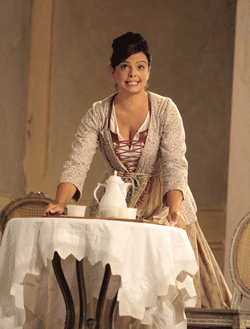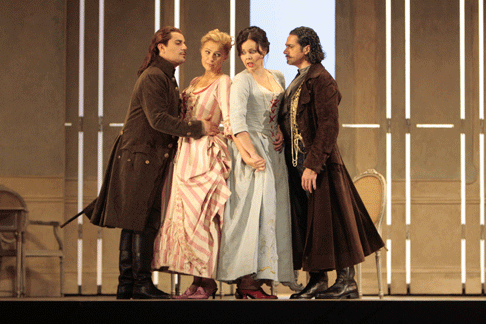10 Oct 2011
Così fan tutte, Los Angeles
The Los Angeles Opera Company’s charmingly understated new production of Così fan tutte will please your eyes and delight your ears, but its story might grieve your romantic soul.

The Los Angeles Opera Company’s charmingly understated new production of Così fan tutte will please your eyes and delight your ears, but its story might grieve your romantic soul.
Its libretto was written by Lorenzo Da Ponte, who despite the fact that he was both a priest and a professor at Columbia College (not at the same time) had attained notable fame in his youth for licentiousness. The opera’s title means “all women are like that” and its subtitle “La scuola di amante” means “school for lovers.” Ostensibly an education in love, in Da Ponte’s and Mozart’s hands the opera’s lesson is that all women are fickle.
 Roxana Constantinescu as Despina
Roxana Constantinescu as Despina
Guglielmo and Ferrando, two handsome young men engaged to sisters Fiordiligi and Doraballa, swear to Don Alonso, their old philosopher friend that the girls will be faithful to them forever. The cynical Alonso’s assertion that the girls will take new lovers in less than 24 hours if the men follow his instructions, results in a bet. Don Alonso elicits the help of the young women’s maid servant, Despina. The women are told that their heroes have been called to war, and shortly thereafter the two men disguised as “Albanians” appear to declare their passionate, (and sometimes comical) love — but to each other’s girl. Torn by conscience and tempted by the joys of love, the girls suffer a few pangs, but soon give in, each to her sister’s fiancé, whereupon to their mortification, the treacherous scheme is revealed. Then somehow — maybe Mozart didn’t like unhappy endings — there’s a cheerful sextet in which all the characters agree, “let’s get over this and look at the sunny side of things.” But who did the girls go home with? Their first lovers or their second? Mozart and Da Ponte don’t tell us! And if women study this “school’s” lesson a little deeper, they may wonder, “Are all fiancés like that?”
This is an attractive well-matched cast. Happily, the two male leads resemble each other enough to muddle their identities while in disguise, so there’s no little worm to gnaw at your aching-to-believe brain saying, “How could the girls not recognize them?” The production that Nichols Hytner, originally created for Glyndebourne with its tawny sets and blazing blue Neapolitan skies are crisp and elegantly restrained.
 Saimir Pirgu as Ferrando, Ruxandra Donose as Dorabella, Aleksandra Kurzak as Fiordiligi and Ildebrando D’Arcangelo as Guglielmo
Saimir Pirgu as Ferrando, Ruxandra Donose as Dorabella, Aleksandra Kurzak as Fiordiligi and Ildebrando D’Arcangelo as Guglielmo
But it’s the music that triumphs. Maestro Conlon personally chose the cast of European singers for their facility with Italian recitative, as well I am sure, for the quality of their voices. Bass Lorenzo Ragazzo, delivered a cheerful, perhaps not cynical enough Don Alfonso. Bass-baritone, Ildebrando D’Arcangelo as Guglielmo, pranced agilely when required — what a “Mefistofole” he would make! Saimir Pirgu’s Ferrando’s “Un’aura amorosa”and Aleksandra Kurzak’s “Come scoglio” hit their difficult marks. While the tessitura of Fiordiligi’s role unquestionably requires a soprano, the roles of Dorabella and Despina, here mezzos Ruxandra Donose and Roxana Constantinescu, respectively, are not as clearly defined in terms of range and can be sung by sopranos. Most frequently, it is Despina (think saucy Susanna in the Marriage of Figaro) who is cast as a soprano. Constaninescu, however, is perhaps too young to make a properly worldly-wise and arch Despina. The similarity of her sound to Donose’s Dorabella’s reduced the impact of her role and had me wishing for a bright soprano sound.
The essence of this Così is the sense of ensemble: the balance between orchestra and voice, and the clearly visible rapport between the singers and Maestro Conlon. When Conlon stretched past his score with this arms high over his head, and looked directly at his singers, it seemed as if the baton in his hand was a magic wand eliciting spontaneous song.
And did they all have fun with their curtain calls!
Estelle Gilson